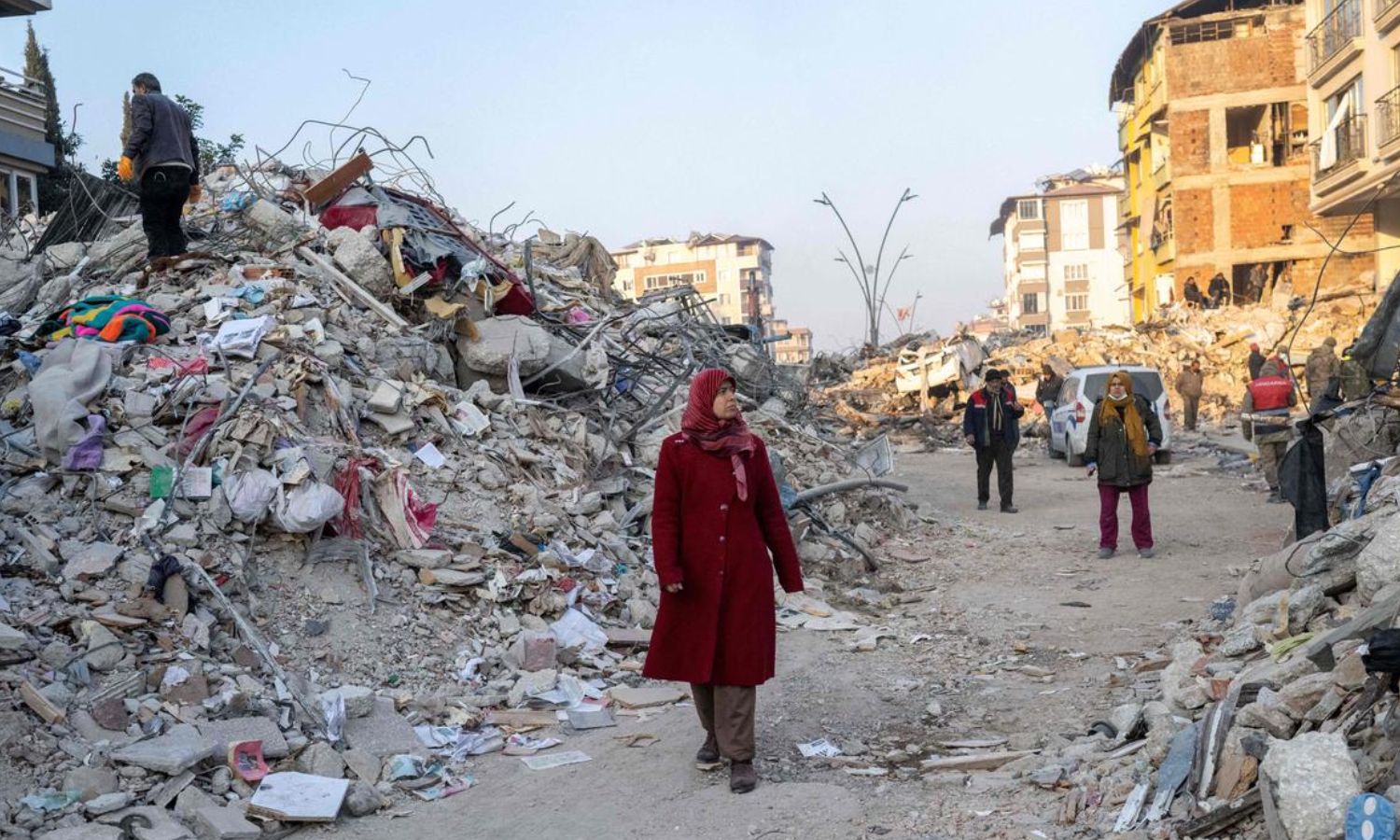



Enab Baladi – Hiba Airout
The 48-year-old Sahar Khaled, an only breadwinner for her family, seeks to reestablish her professional life from scratch after she experienced the bitterness of loss and displacement as a result of the devastating Feb.6 earthquake that hit ten Turkish states and four Syrian governorates, leaving more than 55,000 people killed.
The difficult living conditions and the relative absence of material support provided to those affected by the earthquake in Turkey force Syrian women to search for work, with the aim of covering the basic needs of their families.
Khaled was displaced with her family of six from Antakya region to Trabzon city. The displacement conditions once again forced her to borrow money from her family to cover the treatment of her injured son, the basic needs of her children, and the costs of their studies.
After her quake-related injuries healed, she worked during the holy month of Ramadan as a cook for those affected by the earthquake with the help of humanitarian organizations. She now works short hours without contracts as a health care provider for earthquake victims in private hospitals.
In 2017, Khaled sought refuge in Antakya city after her husband and son were killed in war-torn Syria. During the past years, she worked in all available professions, and at times, she was forced to work part-time at night.
After feeling relatively stable in the city, Khalid established in 2019 her project to sell household supplies to the residents of the Antakya region.
For years, the woman succeeded through her project in managing her affairs and providing for the family, but the earthquake blew up the four-year-old business as her workplace was destroyed.
“Turkeyeh,” a 42-year-old breadwinner mother who is residing temporarily in Istanbul after surviving the quake in Antakya, also established her own project in 2020, calling it “Ya Mal al-Sham” for home cooking.
Despite the poor capabilities and difficult financial conditions and with the encouragement of her family and those around her, the project began to grow and prosper. Turkeyeh promoted her dishes of pastries, traditional “Mansaf” meals, and all kinds of cooking through social media, and she succeeded in a short period of time in achieving profits from this project.
The new displacement imposed on the woman conditions that prevented her from completing her project, as a result of the instability in Istanbul, amid her fear of being deported to Antakya, “which is no longer fit for living,” as her house there was destroyed, according to what Turkeyeh said, in addition to her inability to obtain “a travel permit” easily.
The two women interviewed by Enab Baladi believed that their work in Antakya was more easy and smooth, as the city is small, and it is located on the border with Syria, and most of its people speak the Arabic language, and it was a place of stability for a large proportion of the Syrian refugees.
The two women considered that the city is the most suitable place for refugees to live in, due to its cheap rents, reasonable cost of living, close distances compared to other states, ease of access, and smooth interaction with Arabic-speaking citizens.
Settling in a house was the most difficult challenge due to the high demand for renting houses, and the exploitation of real estate owners for the situation of the displaced from the earthquake zones, and asking them for high sums in long contracts that amounted to six months or a full year, according to what Khalid and Turkeyeh said.
The two women added that there is an additional challenge represented in finding a suitable area of stability, integrating into a new society to gain knowledge and form social relationships, and adapting to a new work environment.
Some factors may prevent the Syrian woman from continuing to work in Turkey, such as the “travel permit” that is currently not extendable, which causes a problem with stability.
Given that the Turkish states affected by the earthquake have a narrow geographical scope compared to the rest of the states, women may face a problem in securing transportation and difficulty in accessing major cities.
A number of research studies attributed the reluctance of Syrian refugee women in Turkey to engage in the work environment to several reasons, most notably psychological fears and lack of material and moral support.
The Danish Refugee Organization (DRC) reported on July 26, that women who support families affected by the earthquake have always faced additional difficulties in meeting needs, and the problems have been exacerbated because many of these families did not have financial savings to meet their needs after the earthquake.
The DRC pointed out that widowed women face many challenges to support themselves and their families.
In a related context, a workshop held by the Istanbul-based Harmoon Center for Studies on “The Reality of Syrian Women in Turkey” concluded that the most important challenges that Syrian women face in Turkey in terms of work and financial independence are represented by the nature of the legal status, the fear of “racism” towards Syrians in the Turkish work environment, and the burdens imposed on Syrian women because of their role in the family, in addition to the lack of knowledge of planning and managing personal projects.
if you think the article contain wrong information or you have additional details Send Correction